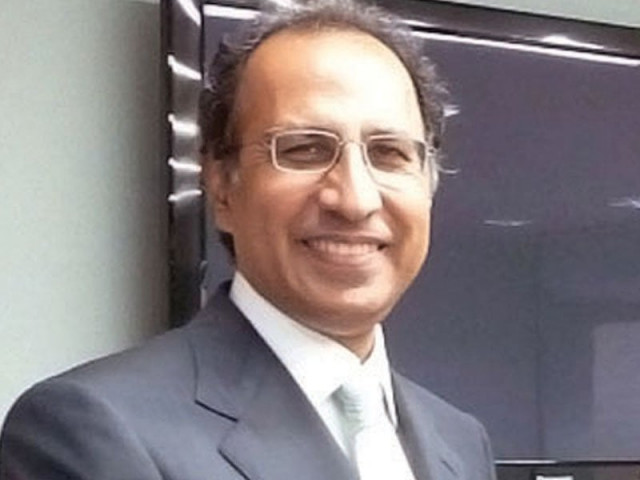Rs600b additional taxes likely in budget
Dr Hafeez Shaikh to present Budget Strategy Paper on April 30

File photo of Dr Abdul Hafeez Shaikh.
Adviser to PM on Finance Dr Abdul Hafeez Shaikh, who serves as de facto finance minister after removal of Asad Umar, moved swiftly on Saturday and decided to present the Budget Strategy Paper in the federal cabinet on April 30 in addition to ensuring that the IMF staff level visit remains on track.
But to hit the goal of tax efforts equal to 1.7% of the Gross Domestic Product (GDP), the government of Prime Minister Imran Khan may have to slap over Rs600 billion worth of additional taxes that will be equal to 1.4% of the GDP, said sources in the Ministry of Finance.
The remaining 0.3% of the GDP will be achieved through administrative and enforcement measures. These numbers will be subject to scrutiny of the IMF Mission that, according to the Finance Ministry, is scheduled to arrive by the end of April.
Finance adviser discusses bailout package with IMF's Pakistan chief
The additional tax efforts are aimed at compensating some of the losses due to poor performance in this fiscal year and protecting defence spending while ensuring primary budget deficit at the same time.
Unlike the previous programme, the IMF this time is aiming to ensure a primary balance on budget that can be achieved only by increasing the tax revenues or cutting back defence and development spending. The government has already drastically reduced development spending and defence is the only major item that it now wants to protect by increasing revenues.
Dr Hafeez Shaikh on Saturday established telephonic contact with the IMF’s Middle East and Central Asia Director Jihad Azour. “I have assured the IMF that Pakistan wants to accelerate process to complete negotiations at the earliest,” said Dr Shaikh in his first but terse public statement.
Dr Shaikh also held a phone discussion with IMF Mission Chief to Pakistan Ernesto Ramirez-Rigo after talking with Azour, according to a statement issued by the Finance Ministry. They discussed the progress of negotiations on an IMF-supported programme for Pakistan.
Both sides expressed their commitment to moving the discussions forward and it was agreed that an IMF mission will visit Pakistan by the end of April. Meanwhile, Shaikh said he would present the Budget Strategy Paper for the next fiscal year in the federal cabinet on April 30.
But in the absence of an IMF stamp, the strategy will be just a theoretical exercise. “I have given a commitment on behalf of the government to Jihad Azour that we want to take the process of negotiations with the IMF forward,” said the finance adviser who assumed his official responsibilities on Saturday.
The IMF had earlier announced to send a staff level mission to Pakistan before end of April but an abrupt change of command at the Q Block, the seat of the Finance Ministry, risked IMF negotiations.
Tax measures
The sources said Pakistan stood ready to make additional efforts equal to 1.7% of the GDP aimed at ensuring primary balance on the budget. Earlier, Pakistan was willing to impose new taxes equal to 1.1% of the GDP or Rs470 billion in fiscal year 2019-20.
In order to conclude the deal, the PTI government showed willingness to make additional tax efforts equal to 1.7% of the GDP or nearly Rs730 billion –which is higher by Rs250 billion over the previous offer to IMF, they added.
But it will not be easy for the government to impose Rs600 billion worth taxes in a single year, particularly when incomes are shrinking and inflation is skyrocketing. Traditionally, the IMF remains skeptical of ‘administrative efforts’ whose success depends upon success of a rotten tax machinery.
Finance Ministry sources were of the view that without additional tax efforts equal to 1.7% of the GDP, it would not be possible to ensure a primary balance.
Delay in taxation treaty hurts trade with Australia
Like the previous years, the government would also book primary deficit that means the government’s revenues were not sufficient to pay the debt servicing cost. In light of these arrangements, the primary balance in the fiscal year 2019-20 will be slightly over half a percentage point.
The IMF had asked Pakistan to increase the Federal Board of Revenue’s (FBR) Tax-to-GDP ratio to 13.2% to be precise. In response to that Pakistan had offered to increase the ratio to 12.7% of the GDP.
But the sources said due to extremely poor tax collection in this fiscal year, the FBR’s revenues would not be more than 10.5% of the GDP and it needs to jack up the base by 2.2% of the GDP in a single year. Most of it will come from the tax efforts, they added.
Dr Shaikh said on Saturday the IMF talks and the next year’s budget are the two most urgent issues for him. He wants to present his budget strategy paper in the federal cabinet on April 30.
“The budget strategy paper that the Finance Ministry will present in the federal cabinet will be in line with the discussions going on with the IMF,” said Dr Khaqan Najeeb, adviser and spokesman of the Finance Ministry.



















COMMENTS
Comments are moderated and generally will be posted if they are on-topic and not abusive.
For more information, please see our Comments FAQ